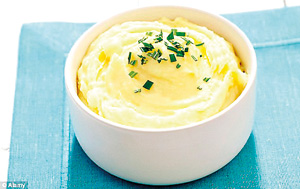Get food-wise now!
Eat unripe bananas

Heating and grinding - eg, mashing or pureeing - starch granules increases the amount of sugar
Green bananas, along with whole grains, vegetables and fibre, all contain resistant starch. This is the most important form of soluble dietary fibre you can eat – soluble dietary fibre is not digested in the small intestine, but is absorbed more slowly further down in the body, where it is fermented by bacteria in the colon to give long-term energy.
Resistant starch is a carbohydrate but, unlike other carbs, its chemical make-up means that it does not cause your blood sugar to rise, so is not a risk for diabetes and it also doesn’t cause sugar-crash hunger pangs after eating.
It also has another slimming advantage in that it stimulates the release of a hormone, glucagon, which boosts the rate at which our bodies burn fat. Resistant starch is therefore a crucial dietary component for managing your weight and blood sugar, as well as helping healthy bacteria to grow in your large bowel, thereby reducing the risk of colon cancer.
Green bananas are the best source of resistant starch: the less ripe a banana is, the more resistant starch it contains. Expert bodies such as the Commonwealth Scientific and Industrial Research Organisation, the official science body in Australia, recommend eating at least 20g a day.

Green bananas, along with whole grains, vegetables and fibre, all contain resistant starch
Don’t mash your potatoes
The way we cook food can alter the amount of sugar released into the blood. For example, 25 per cent more sugar is released from a potato when it is boiled and mashed before eating, compared with cutting it into chips.
Potato and other carbohydrates contain large granules of starch. Heating and grinding – eg, mashing or pureeing – starch granules increases the amount of sugar by breaking open the membrane that surrounds them, releasing starches that turn into sugar.
Anything like this that you do to a food, such as grinding, pressing and even chewing, accelerates the rate at which the sugar is released into the blood. It increases the surface area of the food – making it easier to absorb and increasing the rate of digestion in the intestine.
When cooking a food such as potato, the heat and the amount of water used also have significant effects on the amount of sugar released, the same Lancet study found. The more a starch-containing food such as potato is heated, loaded with water and mashed up, the more easily it will be digested, releasing its sugar into the small intestine.
And the less manipulated or refined a food product is, the less sugar is released when it is digested. So baking or frying a potato means it will release less sugar than if mashed.
Add a bit of water when you fry
Most of us cook with oil, but over heating can break down cooking oils, producing toxic chemicals called lipid peroxides. When eaten, they can react with proteins and DNA – your cells’ genetic blueprint – in ways that are believed to increase the risk of cancer and heart disease.
Olive oil, particularly extra virgin oil, is best used as a salad dressing and not in cooking, because it starts to burn at a comparatively low temperature and therefore breaks down easily.
When frying, a good tip is to emulate the Chinese and add a small amount of water to the wok or frying pan. This lowers the frying temperature of the oil to 100c and reduces the amount of oxidative damage to the fat which normally occurs
Drink water to reduce back pain
Drinking eight to ten glasses of water a day could significantly ease back and joint pain for up to 80 per cent of sufferers. This is because being dehydrated makes the blood and joint fluids thicker; it also causes crystals of uric acid (a bodily waste substance normally removed in urine) to form in the joints, which can cause gout-like pain.
And every drop of water consumed involves calories being used as the kidneys work to remove the excess water from our bodies. Moreover, drinking water shortly before bedtime has been found to prevent midnight feelings of hunger for nearly 100 per cent of people who were tested, according to Washington University cardiologist, Dr Stephen Sinatra, in his book Optimum Health.
Drinking five glasses of water daily can reduce our risk of colon cancer by 92 per cent, according to a study in the International Journal of Cancer in 1999. Good hydration lubricates our bowels and causes them to move faster.
This reduces the amount of time that potentially carcinogenic waste products stay in our colon. The same amount of water has been suggested to cut the risk of bladder cancer by 49 per cent, and of breast cancer development by almost 80 per cent.
Smoothies
Our bodies have only a limited capacity to deal with high levels of fructose – the fruit sugar found in fruit juices and smoothies, and in high-fructose corn syrup, used as a sweetener in store-bought biscuits, cakes, ice creams and drinks.
That’s because it sneaks past the insulin system. A high intake of fructose bypasses the body’s normal processes of controlling the amount of sugar in the bloodstream – the body produces the hormone insulin to use or store the glucose it gets from food. But high levels of fructose don’t stimulate the body to produce insulin and hormones that suppress appetite.
As a result, fatty substances can build up in the liver, causing them to become enlarged and inefficient, leading ultimately to obesity and type 2 diabetes.
(From ‘Know What To Eat’, by Dr Laurence Booth and Professor Rodney Bilton, published by Supercritical (£9.99). See knowwhattoeat.com
(© Daily Mail, UK)


